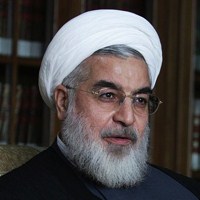One of the major issues affecting U.S. deliberations over whether to accept a nuclear deal with Iran or to cooperate with Tehran in Iraq is the question of how much Iranian foreign policy has changed under Iranian President Hassan Rouhani. In fact, a comprehensive survey of Iranian foreign policy during the past year shows, from Washington’s perspective, major improvements in only a few areas, such as the regime’s nuclear diplomacy, with a harder line on some other issues and broad continuity in most cases.
In the November 2013 interim deal over Iran’s nuclear program, which expires July 20 unless renewed, Iran agreed to stop enriching uranium above 5 percent, increasing its stockpile of 5 percent enriched uranium, reprocessing spent uranium fuel into plutonium, constructing new enrichment facilities and installing or manufacturing new centrifuges (except to replace damaged machines). Iran also pledged to downblend its stocks of 20 percent uranium hexafluoride into a less dangerous oxide form as well as suspend construction work for the duration of the agreement at the Natanz and Fordow uranium enrichment plants as well as at the unfinished Arak heavy water reactor. Furthermore, Iran granted inspectors from the International Atomic Energy Agency (IAEA) more intrusive and frequent access—daily rather than weekly—to its enrichment facilities as well as, for the first time, to its centrifuge assembly and rotor production plants. In return, Iran received targeted sanctions relief worth between $6 billion and $7 billion.
The so-called Joint Plan of Action has lengthened the time Iran needs to manufacture sufficient enriched uranium to make one atomic bomb by 1-2 months. The enhanced inspections have also made Iran’s nuclear program more transparent. But Iran has not agreed to adopt the IAEA Additional Protocol, which allows the agency to monitor more sites, including undeclared ones. Furthermore, Iran has not committed to dismantle any of its nuclear infrastructure or slow development of ballistic missiles capable of carrying nuclear warheads. At present, it remains unclear when, if ever, Iran and its negotiating partners will reach a long-term comprehensive settlement to the nuclear dispute.

